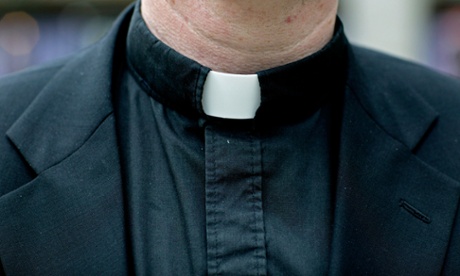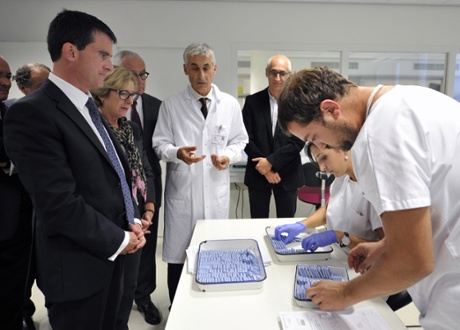The new healthcare: spiritual counseling to keep hospital bills lower
As
a chaplain who provides care to patients, much of my work is not about
religion so much as saving patients’ lives – and savings

I was parked in front of a patient’s home before my visit, running through my checklist.
Patient’s diagnosis and prognosis. Any known family members
or friends supporting the patient. Religious affiliation, if any.
Patient’s name – you should always recheck the patient’s name.
It’s good to know little about a patient’s medical
concerns, but as chaplain, my concern is not what the patient’s illness
is, but who the patient is. I want to address their spiritual needs and
see how their spiritual health affects their overall health.
Do they have loved ones who care for them and support them?
How is their illness affecting their work, their home life, their image
of themselves? What are they living for? Where do they find spiritual
support and strength? These are the kinds of things I want to know.
I go to people’s homes, because there is a need for
spiritual care outside the hospital. It is a huge gap that only recently
has started to be filled. Spiritual needs affect our ability to heal –
and also affects our healthcare costs.
I’ve often found that people who are lonely and isolated
with no one to care for them, who feel they are worthless, who see no
point to their lives – they end up in the hospital sick, again and
again. There’s no real healing without addressing their spiritual
crisis.
Providing basic healthcare outside of hospitals is a
growing trend; I work for MissionPoint Health Partners, which is an
“accountable care organization”, or ACO. These organizations are
responsible for the quality and cost of healthcare for a given group of
patients.
The trend started because one of the biggest ways to get
better care and to keep costs down is by regularly seeing your primary
care doctor. This is especially true for patients with chronic and
terminal conditions.
ACOs get paid for their work through shared savings. An ACO
gets a portion of the difference between what the healthcare costs
would have been without the care management and how much lower the costs
are with the ACO’s help.

Originally, MissionPoint was a Catholic organization that
started by focusing on a patient’s medical issues – it quickly became
clear that that wasn’t going to work.
As we got into the nitty-gritty of managing patients
outside the hospital, it became clear that a lot of times a patient’s
primary health issue wasn’t actually medical. It was social. Or
financial. Or spiritual. And those issues partly made the patients’
medical issues uncontrollable – and expensive.
By providing really great care coordination that was
patient-focused, patients could be healthier, for less money. That
included spiritual care.
Essentially, the idea is to stave off the expensive
hospital visit except for when you really need it, as during a heart
attack or after an accident.
As a Catholic organization, MissionPoint was founded on the
idea that holistic healing meant caring for everything that affected
the patient, rather than purely physical conditions.
But that also means we now have medical services. We have
nurses who visit homes to check in and explain medications and
treatments. We have coaches who try to help smokers quit. We also help
people get to doctor’s appointments, and we work with pantries to
provide food for the needy, give assistance with insurance issues and
much more.
In a sense, we keep people healthier by bringing the
hospital to homes, so that inpatient visits for major treatments are
fewer and farther between. Spiritual care is just one of many ways to
help.
Traditionally you find chaplains in the hospital, because
serious illnesses often cause existential crises. Health and illness,
life and death, joy and suffering are part of a shared human experience.
Chaplains are there to help patients address the human condition.
But patients’ spiritual issues – just like their medical
issues – don’t end after discharge, and sometimes, they worsen,
compounding medical issues and sending people back to the hospitals.
It’s to prevent this problem that I visit patients at home,
call them and sometimes drop in on doctor’s visits. I get to bring
spiritual care to the patients, rather than waiting until the patients
walk back through the hospital’s door.

For example, I’ve visited many patients with
life-threatening illnesses, such as cancer or heart disease, who could
benefit from home-based palliative care. Palliative care relieves the
pain and symptoms of an illness, but doesn’t cure the illness; it’s
usually used in addition to a treatment that tries to cure.
Patients receiving home palliative care can often stay at
their own houses for treatment, and if there’s a trained nurse checking
in regularly, medical issues can be prevented before the patient ever
has to be hospitalized.
However, a lot of those patients and families decline
palliative care, even when the doctor recommends it and the patient
would clearly benefit. It’s often a spiritual block, as when a patient
does not want to confront that she could die, or when a spouse doesn’t
want home care because he or she feels that responsibility lies only
within them – as if to do any less would fail the vows of marriage and
obligations of family.
These are health issues, but to deal with them, patients
have to make decisions that can’t be answered by medicine. The meaning
of our wedding vows, the roles of our loved ones will play in our times
of need, whether we will accept or refuse palliative care – these are
spiritual questions.
As their chaplain, I’m there to be with the patient and their loved ones, and help them work through the decisions that affect their overall health.
Maybe the patient who is afraid of dying needs to figure
out what she’s living for. If the goal is to watch her grandson play
baseball in the state championships, then maybe palliative care could
control her symptoms well enough that she could get to the baseball
game.
Then the palliative care isn’t about dying, it’s about living.

Medical care is essential, but it often takes a back seat
to our fears about illness and death and suffering, and what it means to
love each other.
In many ways, the pastoral care I provide is kind of like
stopping at a spiritual waystation. After our patients leave the
hospital, the goal is help them become spiritually healthy. Otherwise,
their spiritual issues will get in way of their overall health.
And by a healthy spiritual life, I don’t mean that
everybody needs to attend a church or a synagogue or a temple. To me,
having a healthy spiritual life means being surrounded by people who
love and care, to have purpose and meaning in life, and to understand
that each person, self included, is holy and worthy of respect and
dignity.
Sometimes my patients can find love and meaning in a
religious community. Sometimes they find that meaning walking in the
woods.
But for all of them, their spiritual health impacts their
overall well-being, in mind, body and spirit. As their chaplain, I’m
there to help them find spiritual healing, and move on to their
spiritual home.
And hopefully, by healing spiritually, our patients heal
physically too. Outside the hospital. At home, with people who love
them, just as we all hope to be.
No comments:
Post a Comment